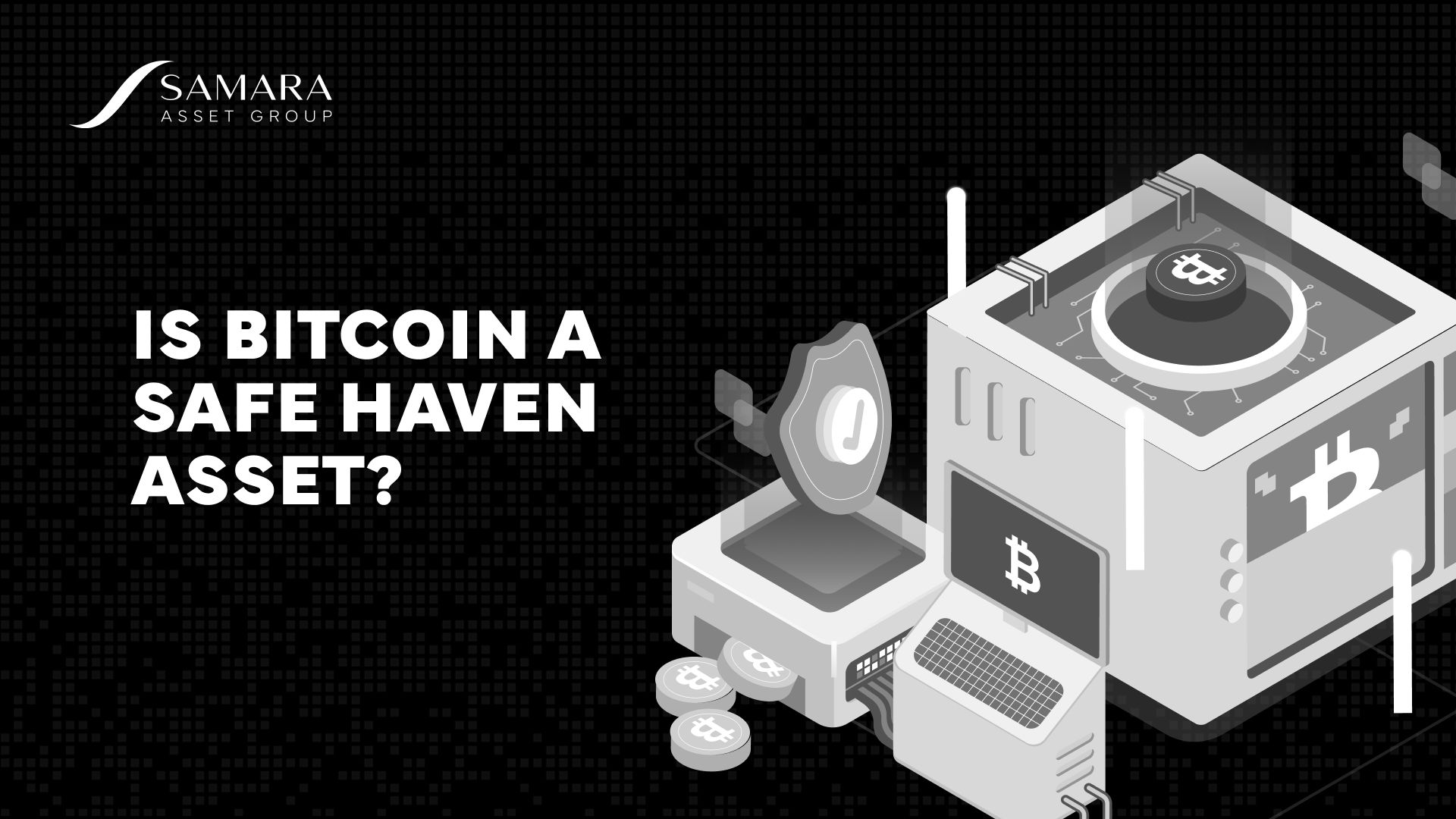Bitcoin
Bitcoin CPI
Venture Portfolio
Funds
Market Insights
Indicators
About
Contact

April 4, 2025





Bitcoin has been described as digital gold, implying that it has qualities similar to physical gold, which would make Bitcoin a safe haven and, more specifically, a reliable store of value for investors.
The question, though, is whether Bitcoin is actually a safe-haven asset, and, if not, what will make it one.
In this guide, we discuss safe-haven assets and why Bitcoin might be one of them.
A safe-haven asset is expected to maintain or even increase its value during times of market turmoil.
Investors generally prefer to allocate to safe-haven assets as a hedge against losses during uncertain market conditions and crashes.
In these times, investors find refuge in safe-haven assets because they typically move independently or inversely to risk-on assets, such as stocks. That means their value either stays the same or increases as most other assets decline.
Precious metals, particularly gold, have been the most preferred safe-haven assets because their value isn’t generally affected by what happens in other markets.
Other safe-haven assets that are often used include government-issued debt securities, such as treasury bills and bonds, and shares of companies that provide essential goods and services, such as food, healthcare, and home utilities, i.e., defensive stocks.
A few national currencies are also sometimes taken to be safe-haven assets. A case in point is the Swiss Franc, which finds itself on the list primarily because of Switzerland's political and financial stability as well as its neutrality in geopolitics.
Besides offering protection during turbulent market periods, safe-haven assets can also add a degree of diversification to an investor's portfolio.

Nowadays, it’s no longer just retail investors who are buying Bitcoin; institutional investors are on board as well, and even public companies (and now nations) are using it as a treasury asset.
Given Bitcoin’s unique characteristics, that isn’t as much of a surprise as some may think.
Let’s take a look at what makes Bitcoin so unparalleled as an asset and as a potential safe haven:
Bitcoin’s decentralized nature secures it from any arbitrary changes to its critical fundamentals and possible destruction. As long as there are enough nodes supporting the network, Bitcoin will exist for all its users. That means its holders can access their coins whenever and wherever they access the internet.
Through decentralization, Bitcoin as a financial infrastructure is owned by all and controlled by no particular individual or entity. This assures its users of future availability and security of their investment.
Bitcoin has a hard cap of 21 million coins, which makes it one of the scarcest assets in the world. Its supply will never exceed this number, which assures holders that they shouldn't expect a huge surge in supply later that can significantly dilute the value they keep in the asset.
In fact, with growing demand over time and diminishing new mints, the value is more likely to increase over time, which adds to its allure as a potential long-term store of value.
Unlike precious metals like gold, Bitcoin is a purely digital asset, which makes it highly portable.
To move with Bitcoin, investors only need to remember the seed phrase, which is 12 to 24 words long. This portability also extends to using it across international borders. Trying to achieve the same with gold, for example, is unimaginable.
Meanwhile, assets like stocks and bonds are tied to particular jurisdictions, and their availability depends on the approval of critical centralized entities.
A key value of a safe-haven asset is its liquidity, meaning how easy it is to sell it whenever you want, including during difficult times. Bitcoin’s liquidity has increased substantially in the past decade. It’s traded 24/7, every day of the week, and you can trade it on any of the many exchanges worldwide.
That whole process can be done within 30 minutes, as all it takes is the Bitcoin transaction to be settled on-chain and the payout to settle via bank transfer or any other payment method.
Bitcoin's decentralized nature makes it a safe-haven asset that is resistant to censorship. It is generally only controlled by the person who owns it. Others, outside of those participating in the network consensus mechanism, have little input on how it should be stored, moved, and liquidated. Even those who update the transaction cannot censor the transaction because the protocol doesn’t allow it.
While Bitcoin has most of the qualities of gold, it offers the holder a lot more control than the latter. Gold can easily be confiscated, and many restrictions exist on how and where it can be moved.
While several factors make Bitcoin a potential safe-haven asset, others work against it. The following are some of the most notable challenges that Bitcoin faces as a safe haven:
Compared to most traditional safe-haven assets, it could be argued that Bitcoin is notably more volatile.
While this isn’t necessarily a bad thing because high volatility is an opportunity for investors who have a risk appetite, those who want to hold Bitcoin as a safe-haven asset might not enjoy the price swings that much.
Some jurisdictions are taking the steps to clarify the legal status of Bitcoin. For example, the Markets in Crypto-Assets Regulation (MiCA) in the EU and the repeal of SAB 121 (where crypto assets aren’t categorized as liabilities for banks anymore) in the U.S.
Still, there is a lot of uncertainty surrounding Bitcoin even in these jurisdictions and even more so in others. Such uncertainty can discourage investors, mainly institutional investors, from putting their money in Bitcoin.
Custodying Bitcoin can be challenging, especially for those who are not tech-savvy. Securing the asset, especially large amounts of it, for the long term requires a high level of understanding and logistics.
Fortunately, a number of projects are emerging to help make securing Bitcoin easier and more accessible to everyone. For example, wallets with gap technologies are becoming more available to Bitcoin holders.
Bitcoin has the fundamentals that make it a safe-haven asset of choice. That includes the fact that it holds its value incredibly well over a longer time frame. We are on the verge of witnessing a major push for more clarity on all fronts, which can potentially move Bitcoin from being a risky asset into a fully established safe-haven asset.
Both Bitcoin and gold are popular stores of value as they hold their value incredibly well, especially in the long term. However, looking at how both have performed in the last decade, Bitcoin has given its holder a much higher ROI.
Not really. The most likely scenario is that Bitcoin and gold will coexist while serving different functions as safe-haven assets. Most investors, including institutional investors, could end up holding both assets in their portfolios.